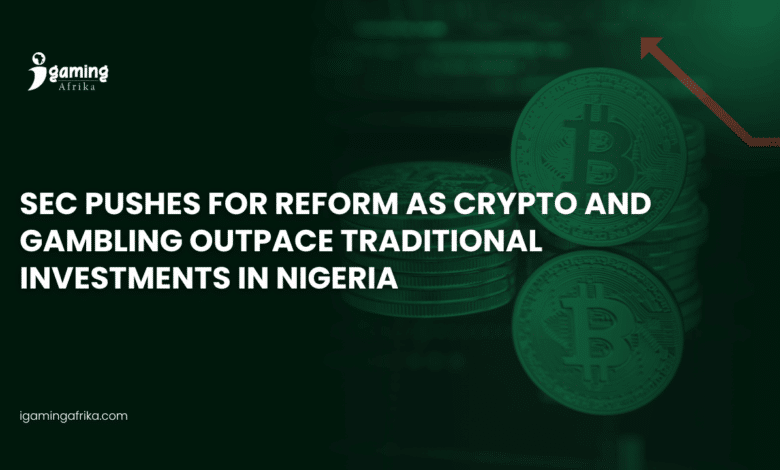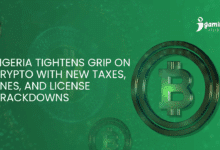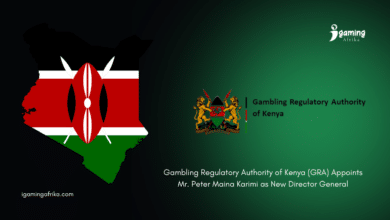SEC Pushes for Reform as Crypto and Gambling Outpace Traditional Investments in Nigeria

In a country where millions stake bets daily and billions of dollars move through crypto wallets, only a fraction of Nigerians invest in the formal capital market. The Securities and Exchange Commission (SEC) says this imbalance reflects not just risk appetite, but a deeper trust deficit threatening the nation’s economic development.
Nigeria’s Appetite for Risk Outside the Capital Market
The SEC has raised concern over the limited participation of Nigerians in the formal capital market despite their growing appetite for risk through other investment channels such as cryptocurrency and gambling. While presenting a paper titled “Evaluating the Nigerian Capital Market Masterplan 2015-2025” at the annual conference of the Chartered Institute of Stockbrokers, Dr. Emomotimi Agama revealed that only 4% of Nigeria’s adult population are active investors in the capital market.
Agama described the low participation rate as a major impediment to national development. While fewer than three million Nigerians invest in the capital market, over 60 million engage daily in gambling, spending an estimated $5.5 million every day. “This reveals a paradox, an appetite for risk clearly exists, but not the trust or access to channel that energy into productive investment,” he said.
He noted that Nigeria’s market-capitalisation-to-GDP ratio stands at about 30%, far below South Africa’s 320%, Malaysia’s 123%, and India’s 92%. He said this gap highlights the urgent need to deepen financial inclusion and rebuild investor confidence. According to him, “Nigeria’s $150 billion annual infrastructure deficit far exceeds the market’s contribution, with only N1.5 trillion approved in Public Private Partnership bonds.” He added that the situation “shows a misalignment between financial innovation and national priorities.”
Crypto and Gambling Outpace Traditional Investments
Dr. Agama expressed concern that while participation in the capital market remains low, alternative investments such as cryptocurrency and gambling are thriving. He revealed that over $50 billion worth of cryptocurrency transactions flowed through Nigeria between July 2023 and June 2024. This figure, he said, highlights both the sophistication and risk tolerance of investors that the traditional market has yet to capture.
Read Also: Nigeria Tightens Grip on Crypto With New Taxes, Fines and License Crackdowns
Nigeria’s embrace of digital assets continues to accelerate as economic pressures and demographic shifts reshape investment behavior. Persistent inflation and the weakening naira have pushed many citizens toward alternative stores of value such as Bitcoin and Ethereum. According to Reuters in May 2025, Nigeria’s annual inflation rate stood at 23.71% while data from Intelpoint indicate the naira lost 129% of its value in 2024, closing the year at about ₦1,478.97 to the U.S. dollar. For a growing segment of investors, cryptocurrencies offer a hedge against local currency depreciation and an opportunity to participate in global financial markets that are insulated from domestic volatility.
Confidence in the sector has also been buoyed by regulatory recognition. The Securities and Exchange Commission in April 2024 formally classified cryptocurrencies as securities under the new Investments and Securities Act (ISA) 2024, providing legal clarity for operators and investors. This policy shift aligns with the country’s youthful profile that is both tech-savvy and eager to explore digital income opportunities. Together, these factors underscore why Nigeria ranks among the world’s most active cryptocurrency markets and why digital assets are increasingly viewed as a viable alternative to traditional investments.
Nigeria’s renewed push to regulate digital assets aligns with the SEC’s broader call for a more transparent and inclusive market framework. The recently enacted Nigeria Tax Administration Act (NTAA) 2025 introduces new registration, reporting, and tax obligations for Virtual Asset Service Providers (VASPs). Non-compliant operators face an initial fine of ₦10 million and an additional ₦1 million for each subsequent month of default. The law also compels VASPs to maintain customer records for at least seven years and to file suspicious-transaction reports with tax authorities.
A Call for Reform and Investor Confidence
Reflecting on the Capital Market Masterplan 2015-2025 (CMMP), Agama explained that the ten-year initiative sought to transform the capital market into a catalyst for national growth by mobilising long-term finance for infrastructure and enterprise development. As the decade-long plan draws to a close, he urged stakeholders to take stock of its achievements and shortcomings. “Today, as we stand at the sunset of that ten-year plan, our task is not ceremonial; it is reflective and diagnostic. We must ask: what did we achieve? Where did we fall short? and what lessons must anchor our next decade of reforms?” he said.
Agama disclosed that less than half of the 108 initiatives under the CMMP were fully achieved, attributing the shortfall to limited alignment with national development plans, inadequate tracking metrics and weak stakeholder ownership. He acknowledged progress in Green Bonds, Sukuk, fintech integration and non-interest finance, but noted that market liquidity remains concentrated in a few large-cap stocks, including Airtel Africa, Dangote Cement and MTN Nigeria.
The SEC chief outlined six pressing challenges that will shape the next phase of market reform; low retail participation, market concentration, falling foreign inflows, under-utilised pension assets, untapped diaspora capital, and a widening infrastructure-financing gap. He stressed that addressing these issues is crucial to aligning the market with national development priorities. The SEC, meanwhile, has pledged to restore confidence in Nigeria’s capital market and build a stronger financial system one capable of channeling the nation’s appetite for risk into productive, long-term investments that drive inclusive and sustainable growth.























